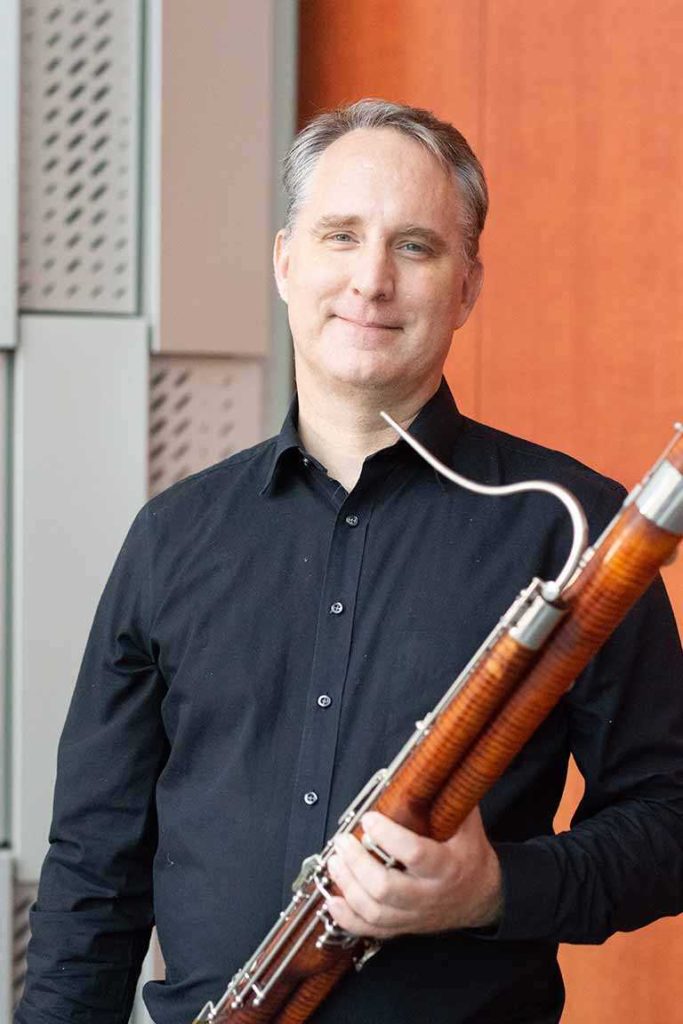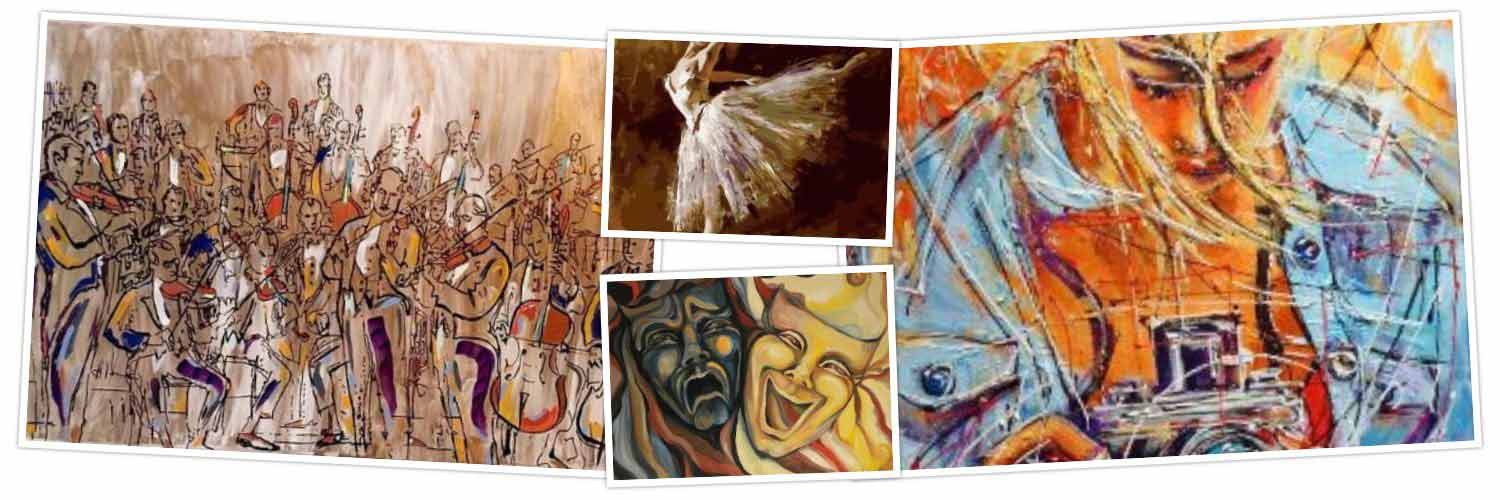Interview Express, Brian Petkovich
BRIAN PETKOVICH, Musician, Member of the San Antonio Symphony and Founder of MOSAS Performance Fund
By JASMINA WELLINGHOFF, Editor
Tell us how you chose the bassoon as your instrument?
I started in the band program at my school. I was kind of recruited to play the bassoon because I was tall in 7th grade. Then one thing led to another, and I enjoyed it.
Explain a bit about the role of the bassoon in a symphonic orchestra?
The most famous work for the bassoon is Mozart’s Bassoon Concerto, but usually you don’t see the bassoon out in front of the orchestra. But what I found out playing in orchestras is that the bassoon has a role in almost everything that happens. It’s a supporting instrument that has to blend with everything. So, the role of the bassoon is to add color and depth, and once in a while take the lead.

You have been with the San Antonio Symphony since 1996, and you must have seen a number of crises that the symphony has been through. How is the crisis of 2021-22 different? You and your colleagues have been on strike since last September.
Coming out of the pandemic, there was a decision (by management) to change what the San Antonio Symphony will be offering to the public- and to offer less. A decision we (the musicians) disagreed with.
Wasn’t that decision based on the Symphony Society’s financial situation?
I disagree with that. They had as much cash to start the season as in previous years since SAS has been at the Tobin. But they chose not to. They wanted to reduce the size of the orchestra and they wanted to see what they could get in concessions from the orchestra. That’s what’s different this time. They really wanted to reduce the number of musicians and reduce the quality of the music offered to the public. It’s been a great orchestra for a long time. San Antonio is growing; there was a big investment in the Tobin Center. It made no sense to reduce the orchestra.
The SAS board members must love the Symphony. Why do you think this has been happening?
I think you have to ask them. Because I don’t really understand, to be really honest. I don’t understand why they’ve taken such a hard line. Back in 2018 there was a city-county task force plan for the Symphony and I don’t know why it was abandoned. That plan laid out a structure about how to get things done. I think we need to look at that in terms of what happened and what did not happen. There was a pandemic in the middle of all that, and I think the Symphony Society could have made a case that after a year of people being inside their homes, there was a need to go out and enjoy a concert and be social.
You now have a new non-profit, the MOSAS Performance Fund, which recently produced several well-received concerts. As its founder, how do you see it developing in the near future?
We are planning for the fall right now. That’s what I am spending my time doing. We need to find partners, people to work with, like the First Baptist Church that hosted our concerts. This is important, we need to find a way forward and people have been responsive to that. I have no idea where this goes in the long run but we are going to let it grow to where it needs to be. The goal for us is to keep the orchestra on stage and keep people employed. We are now out there asking for funding. Retaining talent is the most important thing. So far, it’s been great.
What is your title with the MOSAS Performance Fund?
Technically, I am the chair of the Board but everyone has pulled together and got a lot of things done in a short period of time.
Have some musicians left San Antonio?
People have left to find work but the question is will they be coming back.
What are your summer plans?
I’ll be going with my partner, (pianist) Caroline True to Wyoming where she will be playing at the Grand Teton Music Festival, and I am just going along.
In addition to music, what are your other interests and skills?
You mean like something I did during the pandemic? (laughs)… I like gardening, I like woodworking. But I have been on the board of the Symphony almost since I got here, so that took a lot of my time, too.
You have two children, who are now young adults. What life advice did you consider important to impart?
(After some hesitation) Do not be afraid to fail. I’ve seen people who are so afraid of failure that they never get to do what they want to do. If one of the ten ideas you have is good, you have to be prepared to have nine bad ideas. The belief that everything you do has to be great, keeps a lot of people – artists, especially – from doing what they can do. Also, I try to be a role model for my children.
What’s the scariest situations you have ever been in?
For me, the scarier the situation, the more I calm down, so it’s kind of a difficult question for me to answer. I’ve been worried about my career for a long time. Over the course of my career and all the crises we have had over the years, I have learned not to be so scared of what might happen in the future. Deciding on a classical music career is not exactly scary but it’s a challenge. You have to put yourself out there in some challenging and competitive environments. Everyone who auditions must overcome that.
Speaking of scary situations, we have all been upset and scared by what happened recently in Uvalde. How did you react to this tragic massacre?
I just get so frustrated by the lack of action, politically. I don’t understand why real action cannot be taken to prevent these shootings from happening. The idea that you are just going to run from responsibility, is just ridiculous.
My ex-wife, Vivienne Spy, is from Australia and we were there when that shooting at the McDonald’s happened, in the late 90s. Australia had a legislative response that actually worked. There was a gun buy-back program and requirements for storing guns in gun-lockers. At the time, America and Australia were at about the same place in their attitudes about guns. But then there was a divergence between what Australia did and American didn’t not do.
If you could choose where to live – any country in the world – which one would you choose?
I have always been happy to come back to America.
Do you have favorite places in San Antonio where you like to hang out?
Yes, the Botanical Garden. I really enjoy visiting the Garden. I spend time at the San Antonio Museum of Art, and I enjoy being downtown. The food culture has exploded in San Antonio. It’s always nice to see what’s new in San Antonio.
If you could meet any important person in the world, whom would you like to meet and have a conversation with?
(After some consideration) I would like to meet Joe Biden and ask him some questions. The challenge is really to unify Americans behind a common goal. I would encourage people to have really big goals like a good economy, climate change, the environment. Those would be things I would like to talk to him about.
What makes you angry?
People who can’t see the big picture.
What makes you happy?
Working, working with other people to get things done.
What behavioral traits do you appreciate in other people and which behaviors irk you?
I appreciate people who will argue with me and take different positions but are still willing to communicate. I think it’s a compliment when someone takes the time to engage with you if you have different points of view. As to what irks me, I would say, indecision. I am happy to argue and discuss a lot of stuff but eventually you have to make a decision.
What are you looking forward to?
Wyoming
.

Great interview! Thanks so much for this.
Great job getting a personal point of view. Very well written.
We must forge onward to keep quality classical music alive in SA! Thank you Brian!